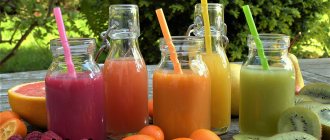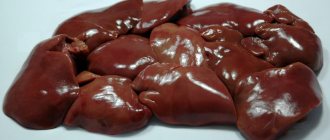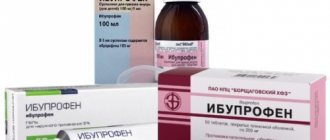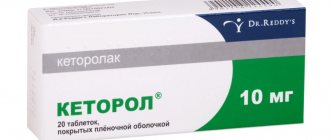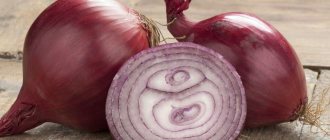The amount of such an element as iron in our body is 3.5-4.5 g. Two-thirds of it is in the blood, and one-third is in the liver, spleen, bone marrow, and muscles. The role of iron is very important. It takes part in the storage and transportation of oxygen, regulation of metabolism, and the production of thyroid hormones. The lack of this element leads to the development of a disease - anemia. It is also diagnosed in nursing mothers. In this article we will look at whether iron is necessary during breastfeeding and how to replenish its reserves.
Why do you need iron when breastfeeding?
Iron is the most important element that is necessary for the child and mother. It is responsible for the composition of the blood and ensures normal material metabolism. A lack of iron leads to a decrease in hemoglobin, causing anemia, and sometimes a delay in the development of the baby. As you know, after childbirth and during breastfeeding, a woman loses a lot of vitamins. These are, first of all, calcium and iron.
Scientists have calculated that from the beginning of pregnancy to the end of lactation, a woman loses 1200-1400 mg of iron. Such consumption can rarely be replenished only by consuming appropriate products. Often, nursing mothers are prescribed special vitamin complexes and iron supplements.
How to treat anemia during breastfeeding: approved foods and drugs
You can increase hemoglobin in a nursing mother with the help of diet, lifestyle correction, folk remedies and medications.
Signs of decreased hemoglobin are increased fatigue, pale skin, decreased attention and headaches. If a woman experiences such symptoms after childbirth, it is necessary to take a blood test. If hemoglobin decreases, the doctor will prescribe a correction, since anemia is a dangerous condition during breastfeeding. Hemoglobin ensures gas exchange in tissues. With its help, oxygen is transferred to the organs, and carbon dioxide comes from them. With a low level of hemoglobin, all biological processes in the body are disrupted, including lactation.
Iron deficiency
Iron is necessary for the normal growth and development of a child. In addition, the element helps a nursing mother recover faster after childbirth. Lack of iron during breastfeeding leads to deviations in the development of the baby. As a result, the baby has difficulty gaining weight and muscle mass. The umbilical wound takes a long time to heal, which increases the risk of pus and infectious diseases. In addition, in children with iron deficiency, the level of intelligence decreases.
When breastfeeding, the iron norm for a woman is 25-35 mg per day. This norm can also be obtained in food. Sometimes your doctor recommends taking special iron supplements. But remember, only a doctor can prescribe any medications!
Iron supplements should be taken if the mother shows signs of anemia. The disease is characterized by severe weakness and dizziness, dry and pale skin, and brittle hair.
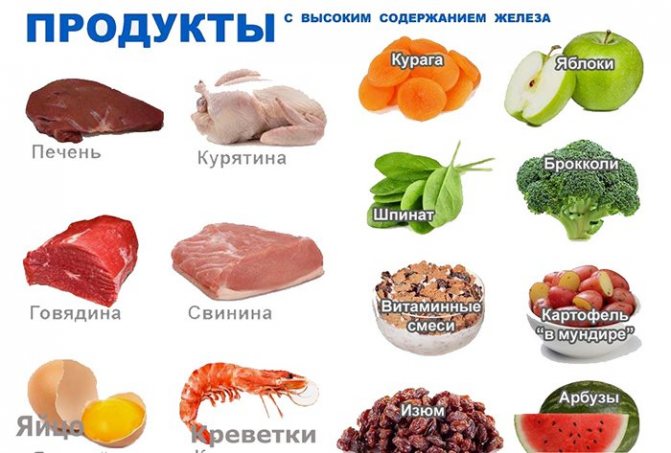
Part I. How to reduce the risk of iron deficiency anemia in a child undergoing breastfeeding.
Have you ever heard of ferritin? I can talk about him for hours, and I do so on my Instagram and on this blog. And yet, half of women of reproductive age in Russia have not yet heard anything about ferritin. If you are one of them, I have just one, but very useful link for you, here: “How to overcome iron deficiency.”
In short, ferritin is a protein that stores iron in the body. This is your personal emergency iron pool. It is also a reservoir where the body stores excess iron that comes from food, if this happens.
It is from this pool that a pregnant woman’s body takes iron so that the placenta and new blood cells in the expectant mother develop. From it, in the third trimester of pregnancy, the baby will fill his small pool with iron. He needs this supply in the first year of life so that the nervous system develops and matures.
It happens that the supply of iron in your pool is depleted much earlier than the end of your pregnancy. And sometimes at the beginning of pregnancy there is no iron in the pool. If it is important for you to know why this happens, then return to my very useful link here: “How to overcome iron deficiency.” But first, read this article! :)
If a pregnant woman does not have enough iron from the inside, then no diet rich in iron from the outside will help. By the end of pregnancy there will be anemia. This means that the baby will not have time to pour enough iron into his pool. This means that after birth, iron deficiency will prevent him from growing and developing. Sleep, appetite, height, weight, motor development and speech may be affected in children due to iron deficiency.
Now imagine that after giving birth, the mother begins to breastfeed the baby. But the iron reserves in her pool ran out during pregnancy. This means that iron does not enter milk. A child with insufficient iron reserves from birth eats milk that is low in iron for several months. By 6-9 months, such babies usually have low hemoglobin, that is, anemia.
Table of foods containing iron
| Product | Iron content per 100 g of product | Rules for use during breastfeeding |
| Beans | 5.5 mg | After 4-5 months, boiled, no more than 20 pieces |
| Beans | 5.9 mg | |
| Lentils | 11.8 mg | After 3-4 months, boiled no more than 25 grains |
| Egg yolk | 7.2 mg | After a month, they start with ⅓ yolk; daily norm – 2 eggs, weekly – 4 |
| Rabbit meat | 4.4 mg | In the first two weeks, boiled, stewed or baked, no more than 150 grams |
| Quail eggs | 3.2 mg | After a month, the daily norm is 4 eggs, the weekly norm is 8 |
| Beef | 9 mg | After 7-10 days, boiled, stewed and baked, no more than 150 grams |
| Beef liver | 9 mg | After 4-5 months, stewed or boiled, no more than twice a week |
| Greenery | 9 mg | After a month, fresh and stewed |
| Cocoa | 12.5 mg | After 3-5 months no more than twice a week, prepared with low-fat milk |
| Pumpkin seeds | 14 mg | After 3 months in raw, slightly dried form, no more than 5 grams |
| Buckwheat | 8.3 mg | After 2-3 months, at first - on water, no more than 150 grams |
| Halva | 6.4 mg | After 3 months without additives and honey, no more than 100 grams |
| Black currant | 4.2 mg | After 3 months in the form of juices, compotes and jam |
| Dried apricots | 4.7 mg | After 2 months no more than 100 grams |
| Raisin | 3.8 mg | After 3 months, a small handful no more than twice a week |
| Almond | 4.4 mg | After 3 months no more than 30 grams |
| Apples | 2.2 mg | From the first week, stewed or baked, after 2 months – fresh |
Why do pregnant and lactating women need iron supplements?
The body of a healthy woman contains 4.5-5 g of iron. The main part of it (about 65% is in hemoglobin), another 31% is in the so-called depots - liver, spleen, etc. About 3.5% of iron is contained in myoglobin (a special protein that stores oxygen in muscles) and about 1.5 % - in plasma and tissue enzymes.
Outside of pregnancy, a healthy woman loses 20-30 mg of iron through menstrual blood loss, and only 10-20 mg enters the body with food, of which no more than 2 mg is absorbed. Such an imbalance is a direct prerequisite for anemia, for the treatment of which iron supplements are urgently needed.
During pregnancy and breastfeeding the situation becomes even worse. As the fetus develops, the volume of circulating blood increases, “demanding” iron, which is also necessary for the development of the fetus and placenta. Thus, by the end of pregnancy, iron deficiency inevitably occurs in the mother’s body.
Add to this the consumption of iron for blood loss during childbirth (which is about 150 mg) and lactation (400 mg) - and it turns out that over the entire period from conception to the end of lactation, a woman loses 1200-1400 mg of iron.
Of course, it is impossible to make up for such consumption only with iron contained in food; it is necessary to add iron supplements.
Iron supplements
If you experience symptoms of anemia, be sure to consult a doctor. Only a specialist can correctly diagnose and select treatment. If there is an iron deficiency, a nursing mother may be prescribed special medications. The products usually come in the form of tablets, syrups or solutions.
It is important to choose the right product, since many compounds can worsen lactation and harm the baby. Tardiferon and Gyno-Tardiferon are safe for nursing. They contain the optimal dose of iron – 80 mg. This will help prevent the development and cure anemia without adverse reactions. They also contain ascorbic and folic acid. The balanced composition of medications is easily absorbed and tolerated.
In addition, to compensate for the deficiency of vitamins and minerals, special multivitamin complexes for nursing are used. Which vitamins to choose when breastfeeding, read the link https://vskormi.ru/mama/food/vitaminy-dlja-kormjashhih-mam/.
source
Maltofer for a nursing mother: why do you need an iron supplement?
During pregnancy, the mother's body gives its baby everything it can give, and often to the detriment of itself. Sometimes the baby receives as many minerals and trace elements as he needs for normal development, and the mother develops iron deficiency anemia (IDA). In other cases, he lacks this essential microelement for his development. Most often, IDA develops in premature babies and infants:
- with a large body weight;
- from multiple pregnancies;
- born to mothers with severe anemia or those who have had late-term bleeding.
In the first months after birth, the baby uses antenatal, that is, prenatal iron reserves received from the mother in utero, but after a few months they are depleted. If the baby eats only breast milk, and the mother has not yet recovered from pregnancy, the baby begins to suffer from anemia.
The importance of iron for a child
The more actively the baby grows, the more iron he needs - it is spent on increasing his blood volume, growth and development of his body. Iron is involved in oxygen metabolism, and with a low level of hemoglobin, the tissues and organs of the baby receive less oxygen than needed.
Iron is necessary for the proper formation and functioning of brain structures, and if it is not enough, the neuropsychic development of the baby is disrupted. The consequences of iron deficiency anemia may remain invisible while the child is very young, but they will definitely make themselves felt in a few years. Doctors have found that in children who suffered from IDA in infancy, at 3-4 years of age, disturbances in the transmission of nerve impulses from the brain centers to the organs of vision and hearing, and disturbances in nerve conduction are often recorded.
The iron content of breast milk is negligible, but it is present in the form of a special iron-containing protein, lactoferrin, and its bioavailability is up to 60%. For comparison: the bioavailability of pharmaceutical iron preparations is approximately 10%. In addition to transferring iron from mother to baby, the protein lactoferrin performs other important functions:
- it “binds” excess iron that is not absorbed in the intestines and thereby deprives the nutrient medium of conditionally pathogenic microflora in the gastrointestinal tract;
- it triggers bactericidal mechanisms in the baby’s gastrointestinal tract and increases the baby’s local and general immunity.
Therefore, it is much more difficult to establish mineral metabolism in artificial babies than in breastfed children. For the same reason, for the treatment of iron deficiency conditions, iron supplements are prescribed primarily to the nursing mother, and if this is not enough, then to the baby.
Children with IDA are prone to colds; they are more likely than their healthy peers to catch ARVI and flu and suffer from intestinal infections and respiratory diseases.
Symptoms of anemia in a baby
The pediatrician will suspect anemia in the baby if the baby looks pale; some children have noticeable bluish circles under the eyes. Infants with IDA have too light mucous membranes (the mucous membranes in the oral cavity should normally be deep pink, but in anemic children they are almost white), changes are also noticeable on the conjunctivae of the eyes. Other signs of iron deficiency:
- general lethargy, moodiness;
- irritability, nervous excitability;
- sweating;
- poor appetite;
- regurgitation, vomiting after feeding;
- difficulty falling asleep or shallow sleep.
Babies get tired quickly (in infants this is noticeable during feeding - they take breaks while sucking or eat often, but little by little). Children under one year old can suddenly “forget” already mastered motor skills. The baby, who was already holding his head, does not seem to remember how it worked for him, and the baby, who was trying to walk, stops getting up on his feet. Sometimes a mother notices that the child’s vision has become worse or has stopped responding to his name.
First aid for blood
In some cases, the mineral composition of the blood after childbirth is restored by itself, but when this does not happen, the mother is prescribed the iron supplement Maltofer®. Its other variety is Maltofer® FOL - it additionally contains folic acid, or vitamin B9. The drug is available in two dosage forms - liquid (drops, solution, syrup) and in the form of chewable tablets.
One milliliter of the drug in drops for oral use contains 50 mg of iron (20 drops); its content in syrup is 10 mg per milliliter, and in solution - 20 mg per milliliter. One chewable tablet contains 100 mg of iron.
- The drops are sold in a bottle with a dispenser pipette; the syrup and solution are measured using a measuring cap. A single dose of Maltofer is dissolved in a small amount of boiled water, juice, tea or other non-carbonated soft drink (except coffee).
- The tablets are chewed or swallowed whole with a third glass of liquid.
The dosage of the drug does not depend on the form of its release; the doctor will select it based on the woman’s condition and whether she has concomitant diseases (for example, for inflammation of the gastrointestinal tract, tablets are prescribed that are gentler on the intestines). Iron deficiency anemia is treated for several months, taking the drug daily, the duration of the treatment course reaches six months or longer. Breastfeeding women are usually prescribed 100-300 mg of Maltofer once a day.
If you are a diabetic and take Maltofer®, take it into account in your daily bread unit calculations. 1 milliliter of drops contains 0.01 bread units, one milliliter of syrup and one chewable tablet contains 0.04 bread units. With 5 milliliters of oral solution you will take 0.11 bread units.
Reviews of the drug indicate that when using Maltofer, some women experience nausea and indigestion (constipation), and less often, abdominal pain. In such cases, the doctor changes the dosage form of the drug or discontinues it and prescribes another remedy to replenish iron in the body. Side effects of taking all iron supplements are darkening of the stool and, less commonly, urine. There is nothing wrong with this; staining does not indicate improper absorption of the mineral or any other violations. After stopping the drug it will go away on its own.
kidpuz.ru
Vitamins for nursing mothers: are they needed, which ones are better, deficiency and overdose
Publication date: 09/12/2018 |
The entire period of pregnancy and until the birth of the child, a woman is exposed to serious stress. Proper nutrition saturates the body with useful substances and normalizes the functions of all systems, which is necessary during lactation.
What is better for a nursing mother: healthy food or vitamins? How and what vitamins can you take while breastfeeding (BF)? What happens in case of overdose and deficiency of vitamins? Every mother should know the answers to these questions.
Do you need vitamins for breastfeeding?
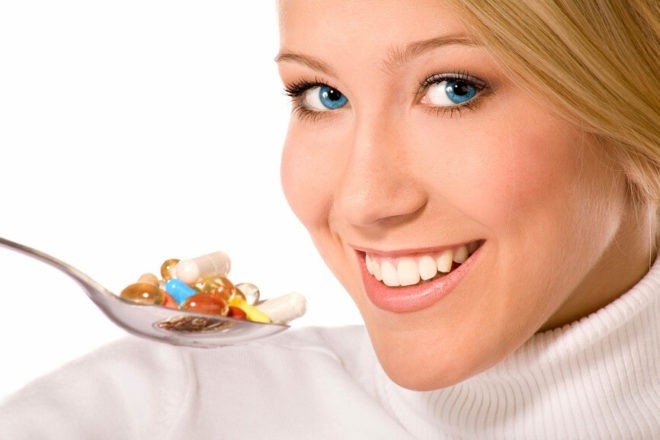
As long as you eat a fairly balanced diet, vitamin supplements are not considered necessary for breastfeeding mothers. The food consumed during lactation completely affects the child’s well-being: nutrients enter the mother’s blood, which, after interacting with lymph, forms milk necessary for the growth and development of the baby. Therefore, it is important to maintain proper nutrition.
In the process of natural feeding, a woman thins out her own reserves and needs to be replenished. If this is not done, then after childbirth the mother may develop bald patches, thin nail plates, and deteriorate the condition of her skin and teeth. Then the doctor prescribes vitamin and mineral complexes that correspond to the mother’s test results.
The famous pediatrician Evgeniy Komarovsky and Kelly Bonyata (a lactation consultant with international certification) are convinced that vitamins for breastfeeding are necessary only in cases of acute deficiency of certain substances (an unbalanced diet or vitamin deficiency in mother and child). Therefore, a woman who eats right does not need them. [4]
Daily value for nursing mothers
Excessive amounts of vitamins consumed when feeding a child are undesirable. Their regular use is much more significant. You can get all the nutrients from the most common foods, as can be seen from the table below.
Table 1 - List of foods rich in vitamins
| Name: | Norm, mg: | Products containing: |
| A | 1 | Cheese, avocado, pumpkin, chicken eggs, peaches, fish, apricots, carrots, liver |
| IN 1 | 15 | Eggs, cereals, corn, milk, meat |
| AT 2 | 2 | Buckwheat, peas, spinach, green onions, rose hips, goose, liver, cottage cheese |
| AT 6 | 2 | Pine nuts, millet, garlic, fish, chicken, liver, beans, walnuts, pomegranate |
| AT 12 | 0.04 | Seafood, processed cheese, sour cream, eggs, rabbit |
| Nicotinic acid (PP) | 20 | Liver, potatoes, carrots, broccoli, dairy products, tomatoes |
| WITH | 0.1 | Berries, citrus fruits, radishes, cabbage, potatoes, sea buckthorn, rowan berries, tomatoes |
| E | 15 | Sea buckthorn, sunflower seeds, rose hips, parsley, nuts, rowan, cabbage, legumes |
| D | 0.01 | Legumes, seafood, milk, parsley, chicken eggs, cheese |
| Calcium | 1200 | Fermented milk products, cabbage, beans, chicken eggs, black bread, sardines, raisins, shrimp, sesame seeds, dates |
| Phosphorus | 1100 | Cheese, bran, meat, pumpkin and sunflower seeds, fish, garlic, nuts, legumes, corn, dried fruits |
| Magnesium | 450 | Buckwheat, peanuts, millet, walnuts, hazelnuts, legumes, seaweed |
| Iron | 60 | Legumes, oatmeal, rose hips, apples, cabbage, prunes, nuts |
| Zinc | 25 | Legumes, oatmeal, barley, liver, pork, duck, turkey, wheat, nuts |
| Iodine | 0.2 | Garlic, beef, rye bread, soy, radish, liver, beets, tomatoes, green salad |
A nursing woman should receive vitamins for lactation with food. Too strict restrictions on food during this period are inappropriate. Mom should eat well, trying not to focus on one dish. You need to forget about salty, smoked, spicy, sweet foods and artificial additives. Your doctor will tell you what vitamins to take while eating right, based on test results.
What to do if you have an unbalanced diet?
Mothers who do not eat animal products or are otherwise at risk for vitamin B-12 deficiency should obtain adequate amounts of vitamin B12 from supplements or fortified foods. [1]
A study in pediatrics reported that 58% of newborns and 36% of mothers were vitamin D deficient, according to blood tests. Although taking prenatal vitamins helped, more than 30% of moms who took them were still deficient. Getting plenty of sunlight helped raise vitamin D levels in mothers, but not in their newborns. [2]
Mothers who smoke cigarettes may benefit from extra iodine. [3]
Is it important to monitor iron levels while breastfeeding?
During breastfeeding, many women experience lack of vitamins and other nutrients. After all, adhering to a certain diet, they are unable to obtain the required amount of microelements from food. Statistics show that the majority of women who feed their children with breast milk suffer from a lack of iron in the body.
Why is iron deficiency dangerous in the body of a pregnant and nursing mother?
Lack of iron during pregnancy and breastfeeding is dangerous due to its complications and the development of various abnormalities in the child. During pregnancy this leads to:
- its interruption, the occurrence of histosis, premature birth with severe bleeding; delayed fetal development;
- the appearance and prolonged course of physiological jaundice in infants;
- decreased intelligence in children;
- increasing the risk of infection with purulent diseases.
Breastfeeding worsens all abnormalities in fetal development. The child will not gain weight and muscle mass well. In such babies, the remainder of the umbilical cord falls off late and the umbilical wound takes a long time to heal; they are more at risk of contracting purulent diseases. Also, most children's level of intelligence decreases.
In extremely severe cases, the pediatrician may strongly advise switching to artificial feeding.
Iron supplements during breastfeeding
Among the large number of medications that help cope with iron deficiency, the most famous are Maltofer, Sorbifer Durules, Ferrum Lek, Totema.
Maltofer is prescribed by a pediatrician if he has discovered iron deficiency anemia in the baby or mother. The drugs are available in several medicinal forms: liquid - drops, syrups, solutions and in the form of chewable tablets. 1 ml of the drug (20 drops) contains 50 mg of iron. In syrup 1 ml-10 mg. The solution contains 20 mg per 1 ml. One chewable tablet contains 100 mg. The doctor will calculate the required dosage based on a blood test and the condition of the child and woman. Contraindications to the use of the drug are an allergic reaction to any component of the drug, hemochromatosis, thalassemia, anemia not associated with Fe deficiency.
Sorbifer Durules is a drug that contains ascorbic acid and ferrous sulfate. The daily dosage of the drug should not exceed 200 mg (2 tablets). The course of treatment is 2-3 weeks. Contraindications include intolerance to the components of the drug, bleeding, serious gastrointestinal diseases, liver and kidney failure.
Ferrum Lek is another medicine that can cope with anemia. It is available in 2 forms: syrup and tablets. Depending on the severity of the disease, 1-3 tablets per day or 2-6 dessert spoons (10-30 ml) are prescribed. Contraindications include hypersensitivity to the components of the drug, hemochromatosis, hemosiderosis, and other types of anemia. Totema is a very effective medicine in the fight against iron deficiency in the body. Available in the form of a solution. 10 milliliters of the drug contains 50 mg of Fe. The daily dose of the medicine is no more than 200 mg of iron (4 ampoules per day). Contraindicated for gastric and duodenal ulcers, children under three months of age, thalassemia, manganese and copper intoxication.
When is iron supplementation necessary?
The following symptoms are observed in anemia:
- dizziness and weakness
- hair fragility
- pallor and dryness of the surface of the skin and mucous membranes
Based on these symptoms and a blood test (hemoglobin content), the doctor prescribes the required treatment.
Iron-rich foods
Iron is found in many foods. The main sources are cattle liver (100 g daily), red meat (900 g), chicken yolk, fish with white meat, buckwheat, dried mushrooms (80-90 g), wheat and rye grains, seafood, nuts, cocoa (170 gr.)
High iron content is present in a variety of fruits and vegetables, as well as in their tops:
- onion, celery, horseradish, garlic;
- tops of young radishes, turnips, carrots;
- sorrel, nettle, lettuce;
- dandelion leaves and any cabbage;
- peas, beans, lentils;
- cucumbers, tomatoes, potatoes;
- beets, pumpkin;
- Strawberry wild-strawberry;
- apples, quince, pears, peaches;
- cherry, raspberry, currant, plum;
- blackberries, blueberries, raspberries.
The body's daily requirement for iron is 10 mg for men, up to 20 mg for women (18 mg for pregnant and breastfeeding women). The maximum permissible value per day is 45 mg. The toxic dosage is considered to be 200 mg.
A lack of any vitamin or microelement in a mother’s body can affect her infant. Therefore, it is very important for nursing mothers to eat a varied diet. Be healthy!
Healthy food or multivitamins: which is more effective?
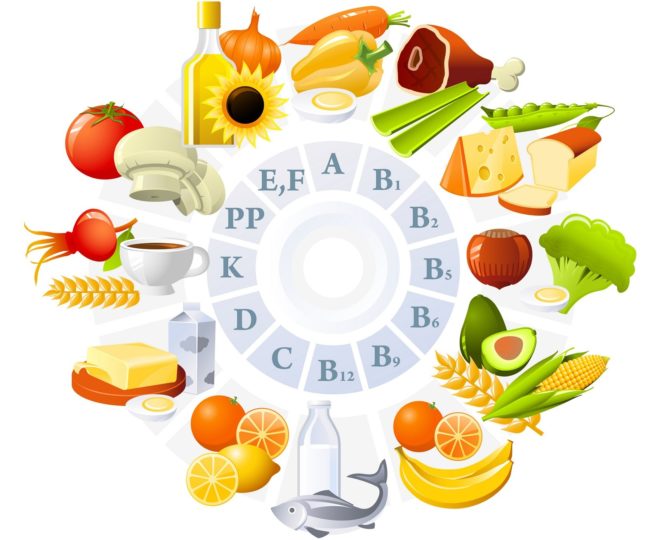
It is best if a woman receives vitamins during lactation from healthy foods and drinks. Thus, it will be possible to most fully provide the body of the mother and baby with everything necessary. But when forming a diet, you must take into account several points:
- The vitamins consumed must be combined with each other.
- The medications should be taken on schedule, at a certain time.
- Heat treatment of products changes their beneficial properties.
- The amount of useful elements consumed must be counted daily.
- Some vitamin-rich foods will have to be excluded when breastfeeding due to the possibility of an allergic reaction.
Many mothers prefer taking ready-made medications to healthy food due to the constant calculation of useful elements, which is a rather lengthy and exhausting process. Multivitamins do not endanger the baby’s health, but it is still worth consulting with a specialist about taking them.
TOP 9 multivitamins during lactation
Multivitamins that can be taken during breastfeeding are often similar in composition to those prescribed during pregnancy. The doctor determines which vitamins to choose based on the mother’s test results. But often the most suitable drugs for a woman are revealed during their use. You may have to try several different complexes for this.
Below are the best vitamins for breastfeeding mothers, according to consumers. They have different compositions, which must be taken into account before prescribing to a woman.
№1 Alphabet ® Mom's health
Vitamins Alphabet Mom's Health is a budget option for a lactation complex. The drug has low effectiveness compared to expensive analogues. These inexpensive vitamins should be taken three times a day. For ease of consumption, they are colored differently.
No. 2 Vitrum ® prenatal forte (vitrum prenatal forte)
The complex includes all essential vitamins and minerals. This remedy is considered expensive, but thanks to these multivitamins, the mother can increase her hemoglobin level and quickly restore the body after childbirth. Excess iron is harmful to health, so the complex should be taken in accordance with the dosages prescribed by your doctor.
No. 3 Complivit ® “Mama”
A budget-friendly formula for breastfeeding enriched with useful elements. Due to its low effectiveness, it should be taken for preventive rather than therapeutic purposes. Complivit “Mama” will protect a woman from possible vitamin deficiency during breastfeeding.
No. 4 Ratiopharm ® Pregnavit
Multivitamins for nursing mothers from Ratiopharm perfectly compensate for nutritional deficiencies during lactation. But the cost of the drug can be classified as “above average”.
No. 5 Elevit ® Pronatal
This very expensive drug has a complete composition, which does not include only iodine. Take it once a day at approximately the same time.
No. 6 Femibion ® Natalker II (Femibion natalcare 2)
For nursing mothers, vitamins are available in the form of tablets or capsules, which must be taken once a day. The main difference between multivitamins is the presence of polyunsaturated acids in them, which are rarely found in preparations for nursing mothers. Thanks to the composition of vitamins, the child will develop fully, and the mother will more quickly restore her body after childbirth.
No. 7 Solgar Prenatal Nutrients (Solgar Prenatal Nutrients)
A complex of vitamins for nursing mothers from Iherb (Ayherb) should be taken 4 times a day with meals. Multivitamins are easily absorbed by the body and have a natural composition that will definitely not harm the baby.
No. 8 Multi-tabs ® Perinatal
This is a complex taken to prevent vitamin deficiency during breastfeeding. A large amount of nutrients in the drug provides the baby with everything necessary for its physical and mental development.
No. 9 Finnish vitamins Minisun ® Mama (Minisan mom)
Multivitamins developed by Finnish manufacturers included all key vitamins and microelements. Take no more than one tablet (small and flat) once a day. The drug is easy to use and practically does not cause allergies.
Table 2 - List of vitamins for mothers during breastfeeding
| Element: | Daily rate: | №1: | №2: | №3: | №4: | №5: | №6: | №7: | №8: | №9: |
| Price, rub | — | 270 | 700 | 247 | 800 | 730 | 980 | 1180 | 730 | 1600 |
| Vitamin C | 100 mg | 50 | 120 | 100 | 90 | 100 | 110 | 100 | 90 | 120 |
| Vitamin B1 | 1.5 mg | 1.2 | 3 | 2 | 1.95 | 1.6 | 1.2 | 1.7 | 2.1 | 5 |
| Vitamin E | 10 mg | 12 | 30 | 20 | 10.5 | 15 | 13 | 0.75 | 10 | 15 |
| Vitamin B6 | 2 mg | 2 | 10 | 5 | 5.25 | 2.6 | 1.9 | 2.5 | 3 | 5 |
| Calcium | 1200 mg | 250 | 200 | 25 | 250 | 125 | — | 1.3 | 160 | — |
| Phosphorus | 1 g | 125 | — | 19 | — | 125 | — | — | — | — |
| Chromium | 50 mcg | 0.025 | 0.025 | — | — | — | — | 0.025 | 0.05 | — |
| Folic acid | 0.4 mg | 0.03 | 0.08 | 0.04 | 0.982 | 0.8 | 0.02 | 0.08 | 0.4 mg | 0.04 |
| Folates | 3 mg | — | — | — | — | — | 0.04 | — | — | — |
| Omega-3 | 500 mg | — | — | — | — | — | — | — | — | — |
| Beta Carotene | 2500 IU | 2 | 0.015 | — | — | — | — | — | — | — |
| Iron | 60 mg | 20 | 60 | 10 | 30 | 60 | — | 27 | 14 | 20 |
| Taurine | 400 mg | 50 | — | — | — | — | — | — | — | — |
| Nicotinamide | 20 mg | 19 | 20 | 20 | — | 19 | 15 | 20 | 27 | 20 |
| Riboflavin | 2.2 mg | 1 | 3.4 | 2 | 2.75 | 1.8 | 1.6 | 2 | 2.4 | 5 |
| Magnesium | 450 mg | 50 | 25 | 25 | — | 100 | — | 450 | 75 | 180 |
| Zinc | 25 mg | 12 | 25 | 10 | — | 7.5 | — | 15 | 15 | 15 |
| Manganese | 5 mg | 1 | 5 | 2.5 | — | 1 | — | 2 | 2.5 | — |
| Iodine | 200 mcg | 0.015 | 0.015 | — | — | — | 0.015 | 0.015 | 0.15 mg | 20 mg |
| Selenium | 70 mcg | 0.04 | 0.02 | — | — | — | — | 0.025 | 0.05 mg | 0.06 |
| Molybdenum | 250 mcg | 0.025 | 0.025 | — | — | — | — | — | — | — |
| Sodium | 1300 mg | — | — | — | — | — | — | 15 | — | — |
| Potassium | 2500 mg | — | — | — | — | — | — | 50 | — | — |
| Inositol | 300 mg | — | — | — | — | — | — | 10 | — | — |
| Soy protein isolate | 80 g | — | — | — | — | — | — | 160 | — | — |
| Kholin | 2000 mcg | — | — | — | — | — | — | 4 | — | — |
| Pantothenic acid | 7 mg | 5 | 10 | 10 | 20.661 mg | 10 | 6 | 10 | 9 | 5 |
| Cyanocobalamin | 4 mcg | 0.03 | 0.012 | 0.05 | 0.0575 | 0.04 | 0.035 | 0.08 | 0.002 mg | 0.03 |
| Phytomenadione | 65 mcg | 0.06 | — | — | — | — | — | — | — | — |
| Biotin | 50 mcg | 0.03 | — | — | — | 0.2 | 0.06 | — | — | 0.03 |
| Retinol | 5000 IU | 0.086 | — | 0.05675 | 1.815 | 90 | — | 0.125 | 0.8 | |
| Ergocalciferol | 0.01 mg | 0.01 | 0.01 | 0.0625 | 0.0055 | 12.5 | — | 10 | 0.005 | 0.01 |
| Copper | 3 mg | 1 | 2 | 2 | — | 1 | — | 2 | 2 | 1 |
1 IU (international unit) = 0.025 mg
What vitamins are best for breastfeeding?
So which of these vitamins are best for nursing mothers? This question does not have a clear answer. Every mother is individual. In addition to personal beliefs, you need to take into account the advice of your doctor - this is the main criterion for switching to vitamin complexes. Let's analyze vitamins for mothers according to 3 criteria: by the number of useful elements in the composition, by price and by reviews of real consumers.
By content of nutrients
The leaders in this parameter are: Alphabet Mom’s Health vitamins and Solgar Prenatal Nutrients from the company Iherb. At the same time, the American analogue costs 3-4 times more.
By price
The cheapest vitamins are Alphabet Mom's Health and Complivit Mom - they will cost 250 rubles. The most expensive vitamins are from Finland: Minisun Mama with a price of 1600 rubles.
According to reviews
Table 3 - Comparison of vitamin complexes by number of reviews and ratings
| Name: | Otzovik | Recommend: | ||
| Number of reviews: | Rating: | Number of reviews: | Rating: | |
| Alphabet | 64 | 87% | 112 | 82% |
| Vitrum | 67 | 85% | 249 | 84% |
| Complivit | 152 | 73% | 216 | 64% |
| Pregnavite | 15 | 86% | 8 | 62% |
| Elevit | 496 | 81% | 458 | 78% |
| Femibion | 32 | 90% | 131 | 90% |
| Solgar | 16 | 87% | 20 | 80% |
| Perinatal | 30 | 76% | 27 | 90% |
| Minisan | 8 | 100% | 12 | 96% |
Judging by the reviews, the leader is the vitamin complex Elevit Pronatal. These vitamins have the largest number of positive reviews from the group under consideration.
Rules for taking multivitamins
You should take vitamins while breastfeeding as follows:
- Multivitamins should be taken in a course, without missing a day.
- The break between courses should not be less than 2 weeks.
- You must follow all instructions and doses of medications prescribed by your doctor.
- It is important to carefully monitor the reaction to the administered complex, since an allergy to the components of the product is possible.
Vitamin deficiency in breastfeeding
Avitaminosis (lack of vitamins) during breastfeeding is just as dangerous as hypervitaminosis (excess). This deviation occurs as a result of poor nutrition, taking a number of medications or diseases of the internal organs. The clinical picture of vitamin deficiency is as follows:
- fatigue;
- pallor;
- dry mucous membranes;
- shortness of breath;
- heartbeat disturbance;
- hair loss;
- change in the appearance of teeth;
- fragility and delamination of nail plates;
- depression and nervousness;
- problems in the gastrointestinal tract;
- numbness in muscles and joints.
Severe vitamin deficiency can lead to the gradual completion of lactation. For example, calcium for nursing mothers is a necessary element of the daily diet. Taking this mineral protects against the formation of blood clots, normalizes blood pressure and prevents pathologies of bone structures.
Overdose of vitamins during breastfeeding
Your doctor will tell you what vitamins a nursing mother can take. Thoughtless, long-term (more than a month) and uncontrolled use of them is fraught with dangerous consequences:
- An overdose of retinol provokes the development of liver pathologies.
- Excessive consumption of ergocalciferol leads to rapid overgrowth of the fontanel.
- Negative reaction to the components of the drug in a newborn.
- Excess iron contributes to the development of organ diseases in an infant.
Even if a specialist has chosen vitamins for a mother during breastfeeding, taking them will have to be stopped immediately if alarming symptoms of hypervitaminosis occur:
- increased colic in a baby;
- skin rashes on the child’s body;
- restless behavior and capriciousness of the baby;
- constipation or diarrhea in the baby;
- swelling and rashes in the mother.
Do I need to take vitamins while breastfeeding? It is possible, but only after receiving the recommendations of a therapist, otherwise you may face unpleasant consequences for the mother and child. If the doctor does not see the need to prescribe a complex of vitamins, then a woman can easily obtain all the substances necessary for a baby from a proper and balanced diet.
Bibliography:
- Dietary Supplement Fact Sheet: Vitamin B12 – the Office of Dietary Supplements, National Institutes of Health (published 01/24/2011).
- Study urges vitamin D supplement for infants – by Liz Szabo (publication dated 03/22/2011).
- Smoking and Breastfeeding – by LLL (publication dated November 16, 2017).
- Vitamins & other supplements for breastfeeding mothers – By Kelly Bonyata, IBCLC (updated 03/27/2018).
source
The need for vitamins during lactation
A nursing mother needs more nutrients than an ordinary person. The development of the child and her own condition depend on how complete her nutrition is. Nature, distributing vital resources, has set priorities in such a way that if the baby does not have enough of something in his diet, he will take these substances from his mother, as a result of which, after childbirth, many mothers’ appearance begins to noticeably deteriorate. Hair falls out, nails become brittle, the skin and teeth also undergo not the best changes (we recommend reading: can a nursing mother have her teeth treated: the opinion of pediatricians).
To prevent the body from becoming exhausted to the limit during lactation, many experts recommend special vitamin and mineral complexes. However, you should know that such drugs, although they are not capable of harm, should still be taken only as prescribed by a doctor, since an excess of even beneficial substances is undesirable.
If a woman eats well both during pregnancy and during lactation, then she does not need additional funds. Beneficial substances obtained by the body naturally cannot replace artificially created analogues. If the need arises, as in the above cases, it is allowed to drink special complexes while breastfeeding, but only on the recommendation of the attending physician.
How many nutrients do you need during lactation?
Vitamins for nursing mothers (A, B, C, D, E) are much more important to receive regularly rather than in large quantities. We will present the list in the form of a table, from which we will see that all useful substances are contained in the most common products. You can try and create a full-fledged menu for yourself based on the data in the table.
| Name | Benefit | Daily value, mg | Products |
| A (retinol) | Improving the condition of skin, teeth, hair, strengthening bones, maintaining vision. | 0,4-1,2 | Liver, milk, eggs, carrots |
| B1 (thiamine) | Function of the nervous system and carbohydrate metabolism. | 15-20 | Legumes, cereals, cereals |
| B2 (riboflavin) | Liver function, iron absorption. | 2,2 | Liver, eggs, rose hips (we recommend reading: can you eat or drink rose hips while breastfeeding?) |
| B6 (pyridoxine) | Formation of the baby’s spinal cord and brain, regulation of the braking function. | 2,2 | Nuts, cabbage, meat, fish |
| B12 (cyanocobalamin) | Function of the liver, nervous system and hematopoiesis. | 0,04 | Meat, liver, fish, seafood |
| PP (nicotinic acid) | Metabolism, regulation of blood pressure and gastrointestinal tract function, improvement of blood circulation. | 18-23 | Meat, eggs, buckwheat |
| C (ascorbic acid) | Strengthening the immune system, reducing inflammation, neutralizing free radicals. | 0,1 | Berries, fruits, vegetables, sauerkraut |
| E (tocopherol) | Synthesis of lactation hormones (see also: products that most effectively increase breast milk lactation). | 15 | Vegetable oils (linseed, buckwheat) |
| D | Work of the heart and blood vessels, mineralization of teeth and bones, prevention of rickets. | 0,01 | Oily fish, liver, eggs |
| Calcium | Building material for bones, teeth, nails, hair. Normalizes heart rate and blood clotting. | 1200 | Milk, cheese, cottage cheese |
| Phosphorus | Formation of bone tissue, work of the heart and urinary system. | 1000-1200 | Fish, cereals, grains, milk, meat, eggs |
| Magnesium | Bone formation, carbohydrate metabolism, strengthening the nervous system. | 450 | Sea fish, berries, legumes, almonds |
| Iron | Formation of hemoglobin and transfer of oxygen to tissues and organs. | 25 | Beef, pork, poultry, liver (we recommend reading: pork during breastfeeding) |
| Zinc | Protein synthesis, strengthening the child’s bone tissue. | 25 | Meat, liver, eggs, legumes, cheese |
| Iodine | Proper functioning of the thyroid gland. | 0,2 | Fish, shellfish, seaweed and other seafood |
In what form is it better to consume nutrients?
Of course, it is best when a nursing mother receives nutrition that provides everything necessary for both her and her baby. However, when creating a menu you should know some nuances:
- To assimilate certain substances and, accordingly, obtain benefits from them, it is important not only their presence, but also their combination with other vitamins.
- To ensure that nutrients are better absorbed, there is an optimal time of day for taking them. Sometimes it’s not so easy to “adjust” your schedule to these biological rhythms.
- The method of preparing foods and their heat treatment itself change the composition, while retaining far from the original amount of vitamins.
- To control whether you are getting the required amount of nutrients, you need to constantly make calculations. It is tedious and time consuming.
- Due to individual characteristics (allergies, effects on the child’s digestion, etc.), there are times when it is necessary to exclude certain foods from the diet, even if they contain many useful substances.
Compared to ready-dosed capsules or tablets, maintaining an ideal diet is not so easy. Vitamin preparations developed specifically for the breastfeeding period do not pose a danger to the baby's development, so many choose this option. It is convenient due to its availability, often reasonable price and ease of use. However, for greater benefit and safety, you should consult a specialist before purchasing.
How to increase hemoglobin
There are several ways to increase hemoglobin after childbirth for a nursing mother. The safest method is to correct your lifestyle and diet. If this does not help, the doctor will prescribe medications that are compatible with breastfeeding. Alternative medicine also offers ways to increase iron levels, but they should be used with caution.

Lifestyle
To increase hemoglobin, a nursing mother needs to spend a lot of time outdoors after childbirth. Walking in the park will benefit not only the woman, but also her newborn baby. It is necessary to choose places for walking where there is a lot of vegetation. It is better to avoid polluted alleys and squares near highways.
If low hemoglobin is accompanied by poor health, you should walk at least two hours a day. While walking, it is recommended to take deep breaths to fill your cells with oxygen.
It is harmful for a nursing mother with anemia to be in a stuffy, unventilated room. During the day, you need to regularly ventilate the room, but protect the newborn from drafts.
Approved drugs
If walking cannot correct a nursing mother’s hemoglobin levels, the doctor will prescribe medications. The dose is selected individually, based on the results of a blood test. The duration of taking iron-containing medications is determined individually.
Medicines for anemia that your doctor may prescribe:
- Sorbifer Durules;
- Aktiferrin;
- Ferrum Lek;
- Maltofer;
- Fenyuls.
Before prescribing a drug, the doctor determines the expected benefits and compares them with possible risks. Most medications do not cause negative reactions in the baby's body because they do not accumulate in breast milk.
Iron-based medications can disrupt a woman’s digestive tract and cause constipation. Therefore, during treatment, a nursing mother needs to monitor the regularity of her bowel movements and the functioning of the baby’s gastrointestinal tract.
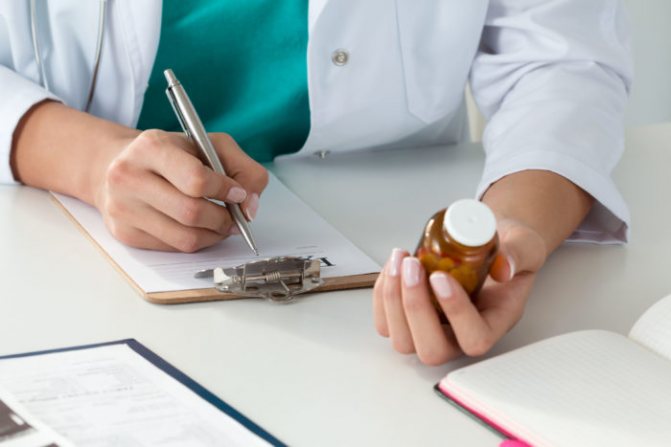
Products
To increase hemoglobin levels during breastfeeding, it is necessary to organize a healthy diet. You can’t stick to a strict diet and sit on cereals. It is necessary to consume a variety of foods, but in moderation, so as not to cause intestinal and skin manifestations in the child.
Animal products and offal help raise hemoglobin after childbirth. They contain divalent iron, which is easily absorbed. Plant foods also contain iron, but in a difficult-to-digest trivalent form.
Foods that increase hemoglobin:
- red meat and fish;
- walnuts;
- egg yolk;
- spinach and asparagus;
- buckwheat grain;
- seaweed;
- black currant;
- dried fruits;
- potato;
- pomegranate and its juice;
- apples;
- honey.
It should be remembered that infants may experience an allergic reaction to new foods. Therefore, new food must be introduced into the diet gradually, starting with small quantities.
During the diet, it is recommended to reduce the consumption of dairy and fermented milk products. They contain calcium, which interferes with the proper absorption of iron. During this period, you should eat foods rich in vitamin C, but in reasonable quantities.
Review of some of the most famous drugs
Multivitamins that are designed for women during breastfeeding are in many ways identical to complexes for pregnant women. Almost all of them contain calcium, vitamin E and other beneficial substances. It is difficult to determine which of them are the best; this is often found out only in practice, since each organism is individual. Choosing is a personal matter for every mother, and we will give a rating of the most famous drugs.
Vitrum Prenatal Forte
This drug also has a good composition - it contains 10 vitamins and 3 microelements - but its price is not affordable for everyone (the product is quite expensive). It allows you to maintain the desired level of hemoglobin and the general condition of the body, because it contains a large amount of iron. However, it is worth remembering this factor and drinking Vitrum Prenatal Forte in moderation, 1 capsule once a day, since excess iron is just as undesirable as its deficiency.
Elevit Pronatal
The composition of this famous drug is quite rich - it contains 12 vitamins and 7 microelements. However, with such diversity, there is no iodine that everyone needs, which will need to be taken separately. The drug is designed to be taken once a day, 1 capsule (preferably at regular intervals). The price of the drug is above average.
Alphabet Mom's health
Analogues of Vitrum Prenatal Forte and Elevit Prenatal are produced at a cheaper price, so they are available to the majority of consumers. This is an undoubted advantage of the drug Alphabet Mom's Health. However, the result of taking it is somewhat lower, although it is completely absorbed. The method of administration is less convenient for constantly busy young mothers - you will have to take the product 3 times a day (morning, lunch and evening), but to make it easier to distinguish the tablets, the manufacturer prudently colored them in different colors.
Composition of the vitamin complex “Alphabet Mom’s Health”
Complimentary Mom
Another inexpensive product containing 11 vitamins and 7 minerals. However, the dosage is significantly lower than the previous complexes, and therefore the effect is noticeably lower.
What is anemia
Anemia is a decrease in the level of hemoglobin in a woman’s blood to less than 110 g/l. It is this border that is the starting point during pregnancy and during the first months after the birth of the baby. Then the norm increases and corresponds to the usual for all women - 120 g/l.
Hemoglobin is a protein that contains iron in its structure. It itself is found in red blood cells. The main function of hemoglobin is to participate in gas exchange, i.e. its molecules bind to carbon dioxide and carry it from the cells to the lungs, where they exchange it for oxygen and distribute it further to the tissues. Accordingly, with anemia, a woman exhibits signs of hypoxia to varying degrees, which leads to disruption of the functioning of the entire body.
Since hemoglobin is directly associated with red blood cells, when its quantity decreases, these blood cells become smaller.
Thus, the following parameters indicate anemia:
- A decrease in blood hemoglobin level below 110 or 120 g/l is mild. Moderate is characterized by its content in the range of 70 - 90 g/l, if lower - pronounced.
- Decrease in the number of red blood cells, their norm in the blood is 3.5 - 5 * 1012/l. Indications vary slightly depending on age, level of physical activity and some other parameters.
- A decrease in hematocrit level, which shows the saturation of the blood with iron. Normally it is 35 - 45%.

